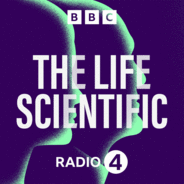Astronomer Paul Murdin believes a good imagination is vital for scientists, since they're so often dealing with subjects outside the visible realm.Indeed, over a long and successful career his imagination has taken him on a journey through space, discovering various new and unusual celestial occurrences - notably the first successful identification of a black hole, Cygnus X-1.Paul tells Jim Al-Khalili how he spent much of his career at the Royal Greenwich Observatory, working with astronomers around the world on some of the most advanced telescopes ever built. He headed up the Astronomy section of the UK’s Particle Physics and Astronomy Research Council, was Director of Science for the British National Space Centre and even has an asteroid named after him.This list of achievements is testament to the fact that Paul has never let his disability hold him back; a leg brace and walking sticks have been part of his life since contracting polio in childhood. But he maintains that as long as you have curiosity and a vibrant imagination, nothing should stand in your way. Produced by Lucy Taylor.

Wissenschaft & Technik
The Life Scientific Folgen
Professor Jim Al-Khalili talks to leading scientists about their life and work, finding out what inspires and motivates them and asking what their discoveries might do for us in the future
Folgen von The Life Scientific
348 Folgen
-
Folge vom 12.09.2023Paul Murdin on the first ever identification of a black hole
-
Folge vom 05.09.2023Bahija Jallal on the biotech revolution in cancer therapiesSome of the most complex medicines available today are made from living cells or organisms - these treatments are called biopharmaceuticals and in this episode of The Life Scientific Dr Bahija Jallal, CEO of Immunocore, shares her story of leaving her home in Casablanca, Morocco to become a world leader in developing biopharmaceutical cancer treatments. She tells Professor Jim Al-Khalili that she has always found herself ahead of the curve. When she began in oncology, the study of cancer, the common treatment was chemotherapy which attacked all the cells in an affected area. Her first studies into cancer treatments were looking at how certain therapies could focus in on the cancerous cells and move away from what she describes as the 'sledgehammer' of traditional chemotherapy.It was an early step in what became known as targeted cancer therapies, and it set Bahjia on course for a career dedicated to developing innovative drugs to improve cancer patients' lives. Through a deep understanding of the science and a resolute commitment to putting treatments in the hands of people who need them, she has produced astonishing results. Bahija has brought drugs to market faster than many believed was possible, and she has managed it by being an inspirational leader and encouraging her teams to think differently. How has she done it? Part of the secret, she says, is diversity of thought. Presented by Professor Jim Al-Khalili Produced by Tom Bonnett
-
Folge vom 29.08.2023Sir Colin Humphreys on electron microscopes, and the thinnest material in the worldHow much more of our world could we understand, if we could take stock of it, one atom at a time? If we could see the structure of individual molecules, understand the complex ways they interact with one another, and witness first-hand how they move?These are questions for electron microscopy, and more broadly, for Materials Science. Materials scientists peer into the atomic structure of the stuff that makes up our world, to figure out the relationships between the structure of a material, and its resulting properties. They study how to change materials at the molecular level, to improve the way they function in the real world. It’s an interdisciplinary field that spans the physics and chemistry of matter, engineering, and industrial manufacturing. It’s led to an enormous number of advances, from nanotechnology to aerospace engineering, pioneering medical innovations to quantum computing.And SOME of these advances are thanks to the work of Professor Colin Humphreys. As Professor of Materials Science at Queen Mary University of London, and Distinguished Research Fellow at the Department of Materials Science at the University of Cambridge, Colin works on materials with fascinating properties that would be hard to understand without delving into their atomic structure: semiconductors, superconductors, nanoparticles, and ultra-high temperature aerospace materials.He’s also a committed student of Christianity and applies his scientific mind to questions of biblical scholarship: calculating the exact date of the crucifixion for example, or naturalistic explanations for miracles.Produced by Emily Knight
-
Folge vom 22.08.2023Chris Barratt on head-banging sperm and a future male contraceptive pillReproductive science has come a long way in recent years, but there's still plenty we don't understand - particularly around male fertility. The reliability and availability of data in this field has become more of a concern in light of a study published this year, suggesting that sperm counts worldwide have dropped 62% in the past 50 years. As yet there is no clear answer as to why that is. Professor Chris Barratt is one of the scientists working to change that. He's the Head of Reproductive Medicine at Ninewells Hospital and the University of Dundee Medical School, and has dedicated his career to better understanding male infertility; driving breakthroughs in how to study sperm dysfunctions – and most recently spearheading advances in developing a male contraceptive pill. Chris talks to Professor Jim Al-Khalili about his academic struggles as a youngster, the lecture that changed his life, his research into 'head-banging sperm' and why he believes a new male contraceptive could be a game-changer.Produced by Lucy Taylor.
